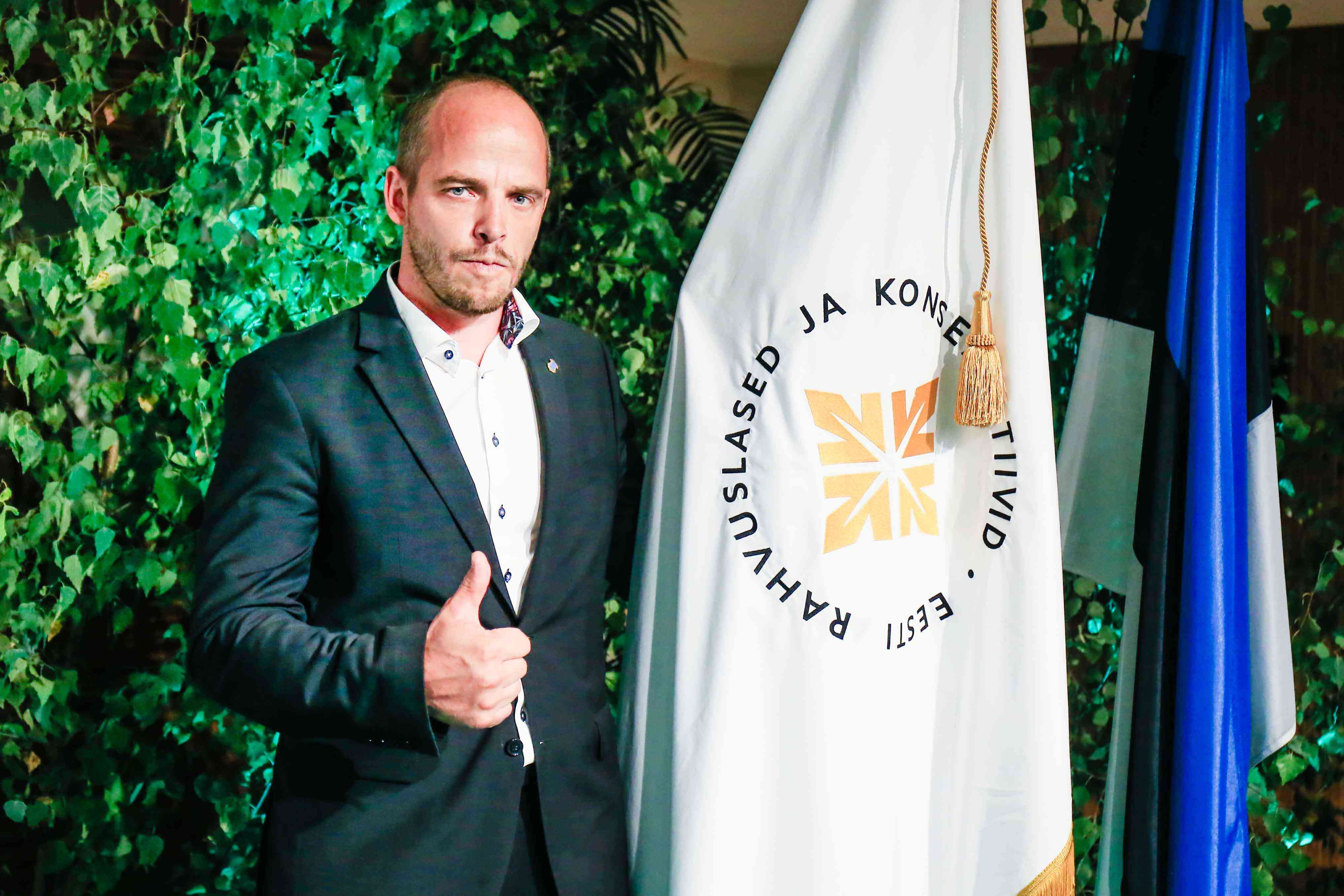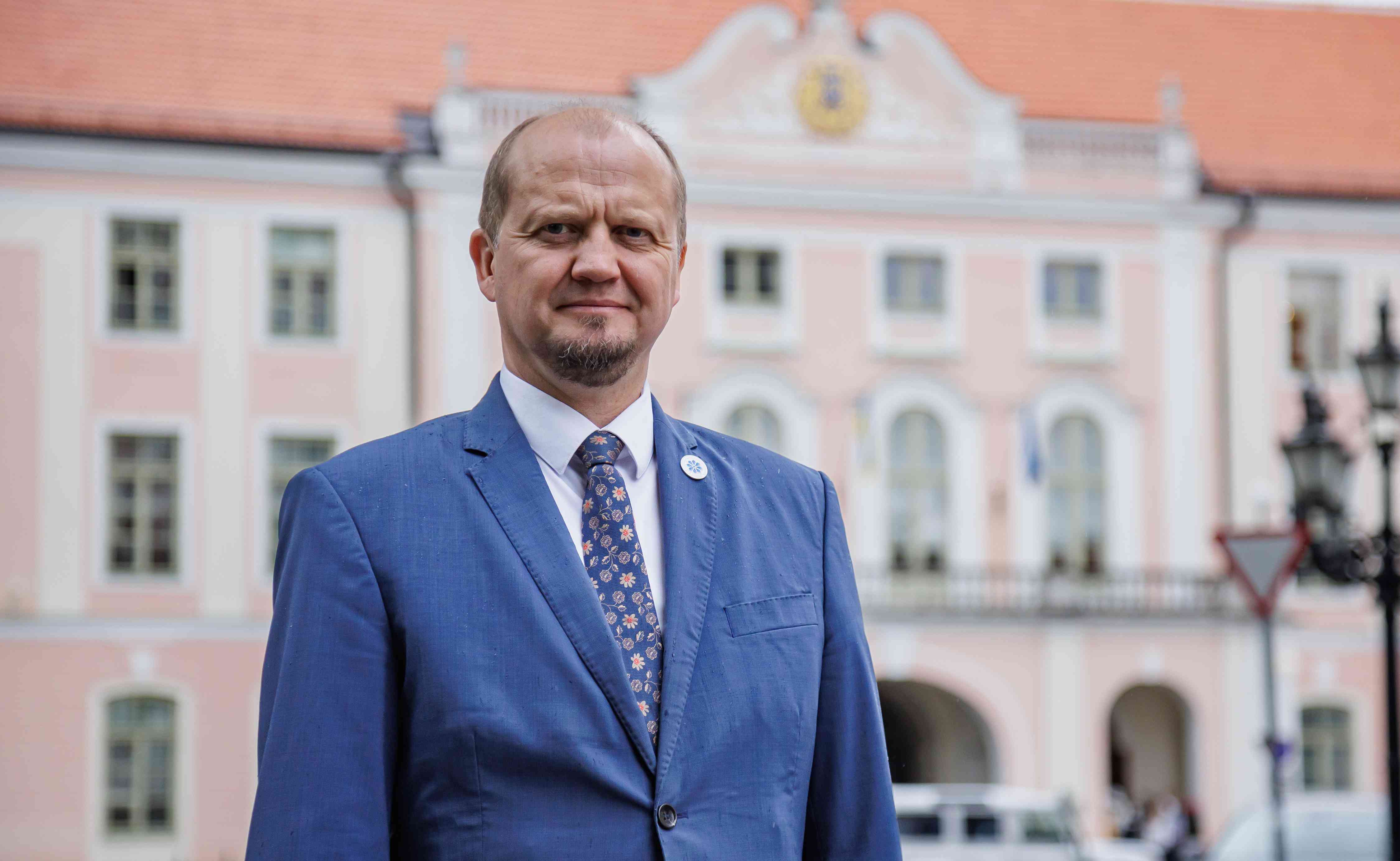Vox Populi

Madis Timpson
chairman of the social affairs committee of the Riigikogu, former minister of justice (Reform Party)
The solution to the issue of voting rights should be straightforward and legally clear. As a lawyer, I
believe that amending the constitution as a matter of urgency would be the most appropriate way to address
this, sending a clear message to society.
If there is a clear will, amending the constitution is not impossible. Estonia's constitution can be changed
in three ways: by referendum, by consecutive sessions of the Riigikogu, and as a matter of urgency by the
Riigikogu. All of these methods have been used in Estonia's history. An urgent amendment of the constitution
involves three readings in the Riigikogu, and the entire process takes about seven months, if the will
exists.
The decision to consider amending the constitution as a matter of urgency is made with a four-fifths
majority of the Riigikogu, meaning four times as many members must vote for it as against it.
Under current legal norms, the last day for a constitutional amendment to take effect would be July 27,
2025, as electoral districts must be formed by that date at the latest. If the bill is introduced at the
beginning of November (for example on November 6) and reviewed by the government that same week, it can be
passed by the Riigikogu at the end of March (seven months before the election). In this case, the law would
take effect at the end of June, leaving four months until the elections. It is high time to start working on
this.

Lauri Laats
chairman of the Center Party group in the Riigikogu
Different parties have proposed various measures to restrict voting rights. Commenting on these, one must
agree with the position of former director general of the Estonian Internal Security Service Arnold Sinisalu
that regarding the upcoming local elections next year, a contest seems to be underway among parties to find
the "best Estonian."
For instance, some parties want to amend the constitution to revoke the voting right of Russian and
Belarusian citizens and holders of so-called gray passports. The Social Democrats, meanwhile, are proposing
a loyalty requirement, initially suggesting that the Internal Security Service oversee this—a proposal
inappropriate for a democratic state and technically unfeasible. This approach resembles the North Korean
regime.
The government parties have not reached a consensus on this issue. We sincerely hope that as the discussion
continues, the coalition partners will have answers to some very important questions. According to various
studies, revoking voting rights from a societal group only increases security risks—have they retracted this
risk assessment, or does the current coalition have new data? Does the coalition's action not contradict the
Venice Commission’s stipulation that a one-year adjustment period should be given when amending the
constitution? Thirdly, is the Social Democrats' proposed "loyalty check" not inconsistent with the
principles of the rule of law?
Investigating the background of thousands of people, crossing out names, and the potential ensuing legal
disputes would only deepen confusion and divide society. Observing how this topic has been handled and the
timing of its emergence, one cannot help but feel that the government's current actions are aimed at
diverting attention from real issues.
Our economy has been in decline for ten consecutive quarters, and the International Monetary Fund estimates
that Estonia's real GDP will fall the most in Europe this year. The latest analysis by the Estonian
Institute of Economic Research indicates that the state of the Estonian economy has worsened, and confidence
in government economic policy is at an unprecedented low, even worse than under Kaja Kallas' government. Due
to these negative indicators, Minister of Economic Affairs Erkki Keldo even refused to hold the traditional
press conference.
Instead of focusing on reviving the economy and improving people's livelihoods, the Reform Party government
is concentrating on an issue that only deepens societal divides and signals the existence of "two Estonias."
Rather than generating information noise, the government should focus on real issues that improve people's
livelihoods and economic well-being. This approach would enable social consolidation, which is undeniably
more beneficial to the country than dividing people and implementing loyalty checks.

Silver Kuusik
leader of the Estonian Nationalists and Conservatives (ERK)
Politicians are known for their faces and unfortunately rarely for their actions. But when it comes to
remembering, things are even worse. Therefore, the ruling power has little reason to worry. Let us recall,
for example, a former president's visit to Russia or the closure of a former prime minister's spouse's
factories in Russia. Or, even more recently, how the city government of the Center Party was removed amid
anti-Russian rhetoric and replaced by a new government that is hardly distinguishable from the previous one.
All the parties in power bear collective responsibility for keeping the borders open, and despite patriotic
speeches, one must admit that there has never been as much Russian language heard in public spaces as there
is now. The numbers show that we are struggling to teach Estonian to as many people as we bring in who do
not speak the language.
The issue of voting rights should have been raised right after the previous elections. It is not too late
now if there truly is a desire for change. The fairest way to do this would be through a constitutional
amendment. The Estonian Nationalists and Conservatives would certainly support it. The loyalty control
suggested by the Social Democrats is unacceptable in a free country.
There is reason to fear, however, that the coalition's primary goal is to secure its own electorate. By
raising the issue and then leaving it unresolved, both the Reform Party and the Social Democrats stand to
gain. The former benefit from the trust of naive citizens, and the latter from that of naive non-citizens.

Tanel Kiik
deputy chairman of the Social Democratic Party
The Social Democrats propose an additional requirement for foreign nationals (including Russian and
Belarusian citizens, as well as stateless individuals) to register as voters in local elections. This means
that only permanent residents who share our country's values, adhere to the Estonian constitutional order,
and condemn the Russian Federation's aggression against Ukraine would be allowed to vote. Citizens of
Estonia and the European Union would not need to register.
The benefit of our approach is that it does not automatically regard all foreigners as adversaries of the
Estonian state. Many other parliamentary parties want to lump the minority who actually support Vladimir
Putin together with all those who have paid taxes in Estonia for decades, raised families, and fully support
Estonia and Ukraine. It is the Social Democrats' stance that we should not push away people who have
successfully integrated into Estonian society.
Moreover, amending the constitution is a lengthy and complex process, and attempting it a few months before
elections is more than questionable from the legal perspective. The solution proposed by the Social
Democrats could be implemented as early as the 2025 local elections without changing the constitution. This
approach also aligns better with the wording in the coalition agreement: "We will develop, in cooperation
with experts in state law, a legal framework to suspend the voting rights of Russian and Belarusian citizens
in local government elections without amending the constitution."

Lavly Perling
leader of The Right
Russia's war against Ukraine has lasted nearly three years; the same parliamentary parties have been in power
for nearly two years, and a year ago, Russia was declared a state with a terrorist regime. Despite all this,
the parliamentary parties have not found a solution regarding the voting rights of the citizens of Russian
Federation in the 2025 local elections.
The bill submitted to parliament by Leo Kunnas, prepared in cooperation with The Right, would suspend the
voting rights of Russian citizens for as long as the parliament has declared Russia a state with a terrorist
regime. This would address the issue for the 2025 local elections and later allow for further public debate
on amending the constitution if needed.
To amend the constitution by the next elections, we need 81 votes of support, meaning broad consensus and
good cooperation. Additionally, time is needed to prepare and discuss which third-country nationals should
retain voting rights in Estonia, because a constitutional amendment, being an extreme measure, must be fully
thought through. If there is political will and excellent cooperation, it might be possible. However, there
is serious doubt such cooperation can be attained in a matter of weeks, as time is limited and considering
that it has not been achieved in the past two years.
In other words, Prime Minister Kristen Michal's promises should be treated with caution, as they may be a
superficial initiative to appease Reform Party voters. The loyalty control proposed by Minister of the
Interior Lauri Läänemets does not stand up to any scrutiny, as it contradicts the principles of the rule of
law.
It is essential that the problem be resolved and that we should not end up in a situation where, due to
delays in decision-making, neither a constitutional amendment is completed nor Leo Kunnas' proposed bill,
which would undoubtedly be a quick and feasible solution, is advanced in a timely manner for organizing
elections.

Hendrik Johannes Terras
chairman of the constitutional committee of the Riigikogu (Estonia 200)
I cannot envision the solution proposed by the Social Democratic Party in the 21st century. I will not dwell
on it any further because achieving our goal requires amending the constitution. Such an amendment could be
completed by mid-March if pursued swiftly. This would mean the law is passed seven months before local
elections. While the Venice Commission recommends not changing electoral rules later than one year before
elections, in times of war, it is reasonable to consider the geopolitical reality alongside this
recommendation. It does not undermine democracy, as seven months provides enough time to adjust for those
planning to participate in the elections. It is doable and should be done immediately—the question is about
willingness.
Support from four parties exists to amend the constitution. Support from the Center Party would be
surprising and is unlikely. Currently, the Social Democrats are holding back this initiative. It seems to be
a political maneuver—Jevgeni Ossinovski's desire to continue as mayor with the votes of Russian citizens.
Julianna Jurtšenko remaining in the position of Lasnamäe city district elder points to this direction. The
Social Democrats now face a choice: either to become the new Center Party or to adopt the position of other
parties that, given the security situation, Russian citizens should not have a say in Estonian democracy. I
hope they reach this conclusion quickly, as the bill should be advanced starting next week. In recent weeks,
Russia has influenced elections in Moldova and Georgia. Does anyone believe it is wise to wait idly until it
is our turn?

Anti Poolamets
member of the Riigikogu (EKRE)
For EKRE, the principle has always been that only citizens should vote. Due to the disregard of this
principle, people who vote for Vladimir Putin at the Russian embassy have been able to participate in our
local government elections.
The situation must be resolved before the local elections. If the Social Democrats do not abandon their
opposition, there is the option of ending the coalition that includes them.
Currently, Kristen Michal appears as a weak leader. Measures such as the loyalty checks suggested by the
Social Democrats are merely attempts to divert attention from the issue and gain the votes of Russian
citizens. The constitution should be amended as a matter of urgency, requiring four times as many votes in
the Riigikogu in favor as there are against to initiate the process. The next phase requires a two-thirds
majority of Riigikogu members. Both results are achievable in the current Riigikogu.

Evelyn Sepp
co-chair of the Estonian Greens
Nothing will resolve this deadlock except a long memory, as political interests are so evident and diverge
greatly from words. This is similar to the situation with expense allowances, party funding from the state
budget, or other matters—self-interest allows processes to be dragged out and blocked indefinitely. The war
in Ukraine has been ongoing for nearly three years, and this government coalition has been in place for 1.5
years.
It is important to understand that a) who votes in Estonia is for Estonian citizens to decide, and those who
should lose this right must accept it; b) in the light of this debate, the focus should not be on whether
Russian and Belarusian citizens living in Estonia are good or bad, but on the fact that they belong to a
state that is hostile and constantly attacks us in a hybrid war; c) the idea of creating a thought police or
even the very idea of the mechanism proposed by the Social Democrats should, with a touch of irony, apply to
everyone, including Estonian citizens. Equal rights, equal obligations to have the right
mindset...

Urmas Reinsalu
leader of Isamaa, member of the Riigikogu
There is no universal approach among democratic European countries regarding the voting rights of
third-country nationals in local elections; some countries allow it, some do not, and some tie voting rights
to reciprocal agreements with third countries.
Most political forces have expressed clear support for the need to make a decision. There has been much
discussion about whether a constitutional amendment is necessary for this or whether it is enough to define
rules at the level of the Local Government Council Election Act.
Currently, it seems that in the interest of legal certainty, it is wise to choose a solution that ensures
maximum legal certainty for the future, both in terms of wording and procedure.
Twenty-eight members of the Riigikogu have submitted a corresponding constitutional amendment bill into
handling by the Riigikogu. This bill proposes restricting voting rights for third-country nationals at the
constitutional level, seeking to amend the constitution as a matter of urgency.
This requires that the decision to amend the constitution be supported by four times as many Riigikogu
members as those who oppose it.
Such a high threshold requires a spirit of cooperation and substantial effort from all forces whose support
could form the necessary majority in the Riigikogu. Is it feasible to achieve the intended amendment of the
constitution in time for the 2025 local elections? The answer is affirmative.
However, I caution that this is only possible if immediate action is taken in the coming days.
Delaying it would mean missing the opportunity, which is tantamount to opposing the measure.








